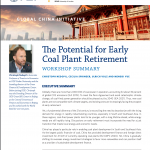In a new policy brief, Christoph Nedopil, Cecilia Springer, Ulrich Volz and Mengdi Yue summarize a workshop and panel discussion exploring potential strategies for the early retirement of coal plants, with a focus on China’s role in enabling this transition overseas.
The policy brief is the result of a workshop co-hosted by the Green Finance and Development Center at FISF Fudan University, the Center for Sustainable Finance at SOAS, University of London and the Boston University Global Development Policy Center in March 2022. Convened under Chatham House rules and supported by the UK Pact Programme, the workshop featured presentations on current practices and challenges of early retirement of coal-fired power plants and a panel discussion on how such early retirement mechanisms could be applied, especially for China’s overseas investments.
Experts from the financial sector, development finance institutions, academia and think tanks in over 15 countries considered questions and topics on how China can support green energy transitions, promising examples of coal retirement and coal retirement mechanisms, additional partnerships and creative financial mechanisms for early retirement and how to incentivize the private sector to participate in early coal retirement.
Key Takeaways
- Coal retirement, while necessary to meet climate targets, is especially challenging in emerging markets with relatively young and competitive coal markets and where coal is a favored energy source.
- Despite the challenges, expert participants identified promising examples of multilateral programs to address coal phaseout and coal retirement, including the Asian Development Bank’s Energy Transition Mechanism, the Climate Investment Funds’ Accelerating Coal Transition Investment Program, the Just Energy Transition Partnership and the Coal Asset Transition Accelerator.
- China, a key enabler of coal plants overseas, must consider coal retirement and support investments toward accelerating this phase-out, as increasing climate ambition in Belt and Road Initiative (BRI) countries puts coal assets at risk of becoming stranded in the future.
Workshop participants emphasized the need for comprehensive consideration of social and economic impacts of coal retirement to ensure a just transition for local communities that rely on coal. Furthermore, future research should focus on specific financial mechanisms for coal retirement, as well as addressing political, social and economic barriers in developing countries with coal plants. The participants also identified the need for progress on developing decarbonization incentives in emerging markets that still rely heavily on coal.





Comments are closed.